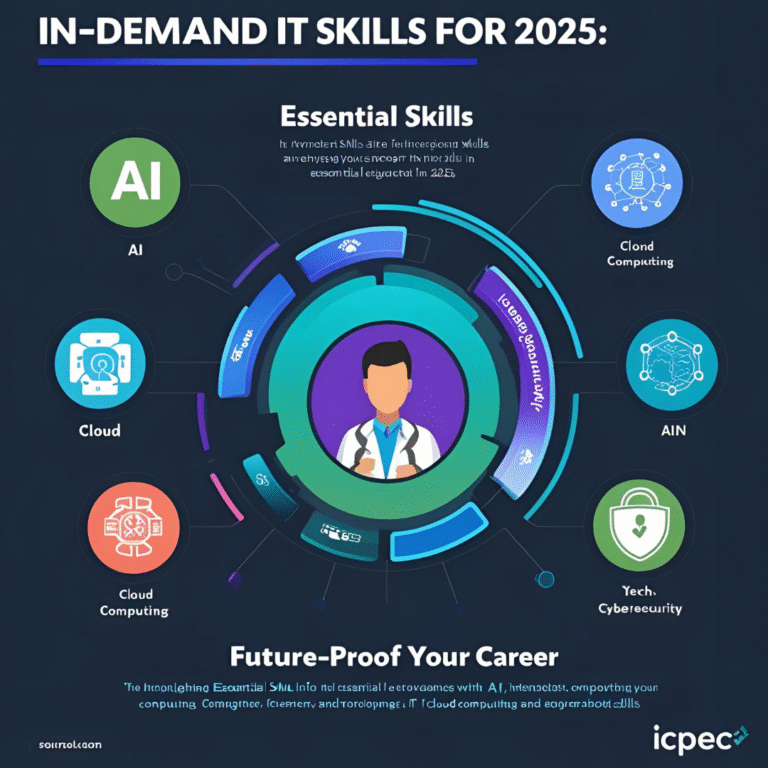Picking what you want to do as a career is a significant choice you’ll have to make. Whether you’re a student, a recent graduate, or someone considering a career change, knowing how to choose the right career path can feel overwhelming—but it doesn’t have to be.
In 2025, because of new industries, flexible working and jobs driven by AI, matching your job to your strengths, beliefs and goals is especially necessary.
Come along as we go over practical steps that will lead you to the right decision for your future.
Importance of Finding the Right Career
A career that brings joy can bring about the following:
- A sense of long-term happiness with whatever work they do
- More reliable financial management
- Personal development and education
- Work-life balance
- In general, being content and well looked after
If you take a wrong path, it could cause stress, make you burn out and cause you to squander important resources. For this reason, analysing the situation before making a choice is especially valuable.
Step 1: Know Yourself
An important starting point in selecting a good career is to assess yourself. That calls for understanding what you own and what you owe.
- Things That Get You Excited – What do you like to explore, read or consider?
- What are your main natural talents?
- Values – What are the most important things to you in your job and personal life?
- Introvert or extrovert? Is a defined set of tasks or some degree of freedom around tasks more important to you?
Tools to Help:
- The Myers-Briggs Type Indicator (MBTI).
- Holland Code (RIASEC)
- CliftonStrengths
- CareerExplorer or 16Personalities
You can start by listing your top 3 interests, what you value and your skills. Treat them like a set of criteria as you look into different careers.
Step 2: Learn about Different Careers
When you know yourself better, look at jobs that fit who you are and what you like.
- Things to Consider:
Which sectors will be growing in the year 2025? - What professions suit my abilities and what I like doing?
- What happen on a regular day for those employees?
- Which skills or background are needed to work in this position?
Where to Research:
- O*NET Online
- LinkedIn has a specialised tool called Career Explorer.
- Glassdoor
- The Bureau of Labour Statistics (BLS)
- Arrange to shadow others or have informational interviews.
Hot Careers in 2025:
- Data Analyst / Scientist
- Cybersecurity Expert
- Digital Marketer
- Healthcare Tech Specialist
- UX/UI Designer
- Sustainability Consultant
Step 3: Start by asking what you want your lifestyle to look like.
You should be able to enjoy your personal life as well as your finances at the end of every day.
Ask yourself:
- Should I look for work that can be done remotely or hybrid?
- What number of hours each week should I spend working?
- Are flexibility and structure both important or is just one more important than the other?
- How much money do I need to earn in order to reach my goals?
Selecting work that suits your ideal life will be better for your happiness and stress levels over time.
Step 4: Cheque what education and skills are necessary for the job.
All jobs have a period during which you need to pick up new skills. There are tasks that ask for you to have a degree and others that ask for certification or just practical know-how.
For example:
- People in tech fields usually have to learn through bootcamps, online classes or build their skills by themselves.
- A lot of healthcare careers require you to study for several years and get a licence first.
- Some creative careers rely more on strong portfolios than on diplomas.
You could take a short course on one of the platforms like Coursera, edX, LinkedIn Learning or Udemy to decide if you like the subject before signing up for a degree.
Step 5: To get involved in real-life cases and projects.
Try to get some real experience before making a final decision about your career direction.
- Options Include:
Internships - Part-time jobs
- Volunteering
- Freelance projects
- Job shadowing
- Informational interviews
Being involved helps you understand exactly what daily work in the role is like.
Step 6: Discuss with Others in Your Career
Professionals in the area you are interested in always have information you can’t get from a job posting.
- Ask them:
Why do you enjoy your job? - Which are the biggest obstacles?
- What are the main steps in a person’s career development?
- What suggestions would you offer someone at the beginning?
Some ways to reach professionals are:
- Career fairs
- Networking events
- Networks made up of former students
Step 7: Set yourself clear and attainable professional objectives at this point.
When you have decided what you want to do, create specific targets to guide your steps ahead.
- What makes a goal SMART is that it is:
Specific - Measurable
- Achievable
- Relevant
- Time-bound
Example: “I plan to complete my digital marketing certification in the next 3 months and apply for a marketing position by August 2025.”
Step 8: At this point, create a Career Development Plan
Determine what actions to take now:
- Is a degree or special licence required for me?
- How can I put together a portfolio or get experience?
- Which skills should I improve and learn?
- Who are the companies or industries I should go after?
A roadmap helps you stay disciplined and motivated.
Step 9: Be Open to Change
Your progress in your career may not follow a set step-by-step rule. What you’re interested in to start might change as you explore other disciplines.
In 2025, career shifts are more accepted than ever.
Stay adaptable by:
- Acquiring new skills all the time
- Following industry trends
- Taking time frequently to cheque your goals and level of happiness
Step 10: Start Taking Steps and Do Not Delay
When you overthink, you may end up not able to make a decision. Get involved slowly, for example by signing up for a class, looking for a volunteer job or arranging to talk with someone in your desired field. Every progress made makes things clearer.
Final Thoughts
There is no quick answer about your career—it’s something you find out as you go. When you know yourself, cheque out your options and choose your goals, you will be more able to make smart and strong choices.
Picking a perfect career involves finding a fit with who you are and what you desire in life, not just having a job with a great reputation or good pay.
Begin now and tomorrow you’ll be glad you did.










